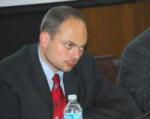Vladimir Kara Murza
MOSCOW — Last Sunday, Russian citizens once again refuted the Kremlin’s propaganda image of a nation united behind the aggressive actions of a dictator. Some 50,000 people, according to media estimates, marched through downtown Moscow to protest Vladimir Putin’s war against Ukraine and his escalating crackdown on what remains of civil liberties in Russia. For the first time in many months, the demonstration was backed by all of Russia’s pro-democracy parties, including the People’s Freedom Party, Yabloko, and Progress Party. Demonstrators were chanting “Peace to Ukraine, Freedom to Russia!,” “No Putin, no war!,” and—by far the most popular slogan—“Russia without Putin!”
http://www.worldaffairsjournal...“There are many—very many—of us,” wrote Boris Nemtsov, former Russian deputy prime minister and co-organizer of the march. “This gives us strength and belief in our victory… Nobody—not even the lying propaganda machine—can dismiss tens of thousands of educated and free-thinking people as a fringe.” An opinion surveyconducted this week by the Levada Center showed that—despite the barrage of Kremlin propaganda denouncing the antiwar protesters as “traitors”—29 percent of Russian citizens expressed support for the September 21st march.
Small groups of Putin supporters holding flags of the “Donetsk People’s Republic” tried to stage provocations and attack the protesters along the route of the march, but were little-noticed. Unlike the opposition, the Kremlin can only bring its supporters to the streets through administrative means, financial incentives, or coercion.
The day before the peace march, Mikhail Khodorkovsky, until recently Russia’s most prominent political prisoner, relaunched his Open Russia movement, which aims to support and give voice to the millions of pro-democracy, pro-European Russians who have been marginalized by the Putin regime. “The notion that ‘Russia is not Europe’ is a lie imposed on society by those who want to stay in power forever,” Khodorkovsky said as he presented the movement. “We consider as our allies all those who believe in… the rule of law; in public oversight of the government; in the regular rotation and accountability of state bureaucracy.”
Open Russia was revived eight years after being forcibly shut down by the Russian authorities. Its relaunch and the opening videoconference that linked civil society activists in ten cities across Russia—from Kaliningrad to Tomsk—were greeted with the typical official response. Almost all regional locations experienced difficulties with the Internet, which was mysteriously cut off minutes before the conference. In Moscow, conference participants were confronted by “journalists” from the notorious NTV channel, which specializes in slandering civil society and opposition activists (incidentally, the location of the event was never publicly announced). In Yaroslavl, someonesabotaged the door lock the night before the conference, leaving activists unable to enter, and the technical equipment blocked inside. In Nizhny Novgorod, members of a pro-Kremlin group headed by United Russia deputy Yevgeny Fedorov stormed the hall where conference participants were assembled.
Despite the best efforts of “unknown” saboteurs, Open Russia’s conference went ahead as planned, and the vast majority of regional activists were able to join the conversation.
The question that arises—whether from the patent rigging of the recent elections; the thousands of heavily armed Interior Ministry troops encircling the antiwar protesters in Moscow; or the coordinated attempts to prevent Open Russia’s refounding conference—is an uncomfortable one for the Kremlin and its supporters: Why is the supposedly “popular” regime so afraid of the supposedly “insignificant” opposition?

